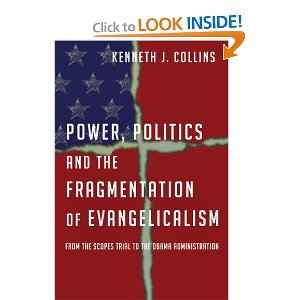My colleague Ken Collins has written a first rate, very stimulating book about Evangelicals and politics. In one sense, it is a history of Evangelicalism from the Scopes Trial to the present, showing the various ways Evangelicals have tried, both successfully and unsuccessfully in politics. In another sense, what it is is a calling all Evangelicals above the fray of partisan politics to a recognition that the Gospel is bigger than particular visions of social justice, economic justice etc. I attach here a link to the book on Amazon
And here are some summaries from Ken’s own powerpoint presentations on the book.
The heart of this book explores the shifting fortunes of evangelicals, from 1925 to the present, in terms of their attempt to regain some of the social, cultural and political power lost during this period in order to become more effective in witnessing to Jesus Christ in America.
In this pursuit of power and influence on a way to a more firm identity, evangelicalism ironically enough became fragmented by elevating and in some cases making decisive particular conceptions of politics and social justice, matters that were best left open to allow for a diversity of views within the evangelical community.
The evangelical community is following some of the practices of mainline denominations by privileging particular conceptions of social justice and politics, whether from the right or the left, and placing such judgments in the highest rank where they simply do not belong.
The universality and catholicity of the gospel, in contrast, transcends such second rank, less-than-ultimate judgments.
In other words, social and political justice can be variously conceived in viable and legitimate ways, and one is no less Christian or evangelical for differing in this area so long as the basic precepts of the moral and natural law are affirmed.














